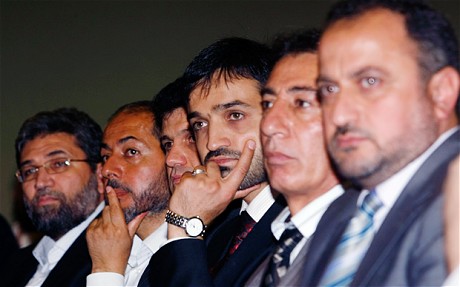 Opposition members at launch of Syrian National Council (Photo: AP)Justin Vela writes for Foreign Policy magazine:
Opposition members at launch of Syrian National Council (Photo: AP)Justin Vela writes for Foreign Policy magazine:
Omar Muqdad can usually be found smoking and drinking coffee all night in an empty room in Istanbul or Ankara. As a longtime Syrian activist, he can access senior Syrian opposition leaders, as well as their network of supporters around the world, with a phone call. He enjoys a sterling reputation among the activists and defected soldiers who risk their lives daily along the Turkey-Syria border.
But over the months, Muqdad's frustration with the Syrian National Council (SNC), the body intended to serve as the political representation of the Syrian opposition, has grown. He has diligently traveled around Turkey, arranging coverage of the Syrian uprising by major media outlets, holding meetings in Western embassies, and coordinating with activists inside the country. In the meantime, he has come to see the SNC as disorganized, disconnected from the Syrians on the ground, and out of step with the broad spectrum of Syrian society.
"We know it is impossible to be 100 percent representative of the nation or the opposition," Muqdad told me. "[But the SNC] does not know the principles of running the opposition."
Last weekend, defected soldiers belonging to the Free Syrian Army (FSA) waged fierce battles with the Syrian military in the suburbs of Damascus, stirring activists' hopes that the end of President Bashar al-Assad's regime is closer than had been expected. The U.N. Security Council is also meeting this week to consider a new resolution that could condemn the regime for the violence and possibly endorse an Arab League plan that would lay out a blueprint for the transition of power. Even as Syria's revolution gains speed, though, the SNC's struggles may hinder international action against the Syrian regime.
It's not only Muqdad whose initial optimism regarding Syria's organized opposition has faded. A wide range of activists and diplomats are voicing concerns with the SNC, criticizing its lack of cohesion and effectiveness. While the majority of them have not given up on the council, they paint a picture of an organization out of touch with the protesters on the ground and dominated by the Syrian Muslim Brotherhood.
"No one from the SNC has influence inside Syria. Most members of the SNC are jumping on a train that started from the street," says Ammar Qurabi, a Syrian human rights activist, arguing that SNC leaders are trying to use the momentum of the demonstrations to take political power. Qurabi refuses to work with the SNC and plans to launch his own opposition group in early February.